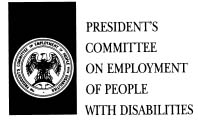 |
||||
|
A View From The Chairman
When the President’s Committee on Employment of People with Disabilities was established by President Harry S. Truman in 1947, it was commonly perceived that people with disabilities could not live independently in the community, could not have a full social life, and could not work. It was generally believed that society should take care of "the unfortunate." The media reinforced these misconceptions. People with disabilities began to chip away at these attitudes in the 1960's as they opened Centers for Independent Living and advocated for the passage of disability rights legislation. Nonetheless, the frontier was not crossed until 1990 with the passage of the Americans with Disabilities Act. With the outlawing of discrimination against people with disabilities, the paradigm began to shift. The next vista is changing attitudes of the general population. There are still too many people in our country who think workers with disabilities can't cut it, who think we are to be pitied and patronized. They couldn't be more wrong, morally or economically. In their second report to the President, The Presidential Task Force on Employment of Adults with Disabilities recommended the establishment of an Office on Disability Policy to be headed by an Assistant Secretary of Labor. That recommendation was accepted, and funding was included in the FY 2001 budget. The President’s Committee’s programs, functions, and staff will be transferred to the new office. This initiative will elevate disability employment issues within our nation’s premier employment agency, and will provide disability employment advocates the opportunity to forge alliances for full inclusion of people with disabilities with the many Department of Labor agencies that conduct and fund our country’s major employment programs. A New Paradigm of Disability, A Bibliography will be an important tool for the work of the new office. Thank you for your interest and support throughout these decades, and please, never cease to strive for the completion of the mission. |
||||
| Tony Coelho | ||||
|
|
||||